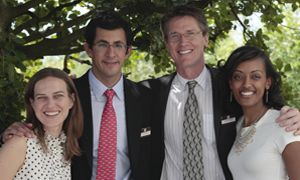Making a positive impact by reducing greenhouse gases

On Friday 13th June 2014, four students from University of Michigan - Ross School of Business, were awarded winners of the 2014 Nespresso Sustainability MBA Challenge. Seventy business schools from 26 countries participated in the challenge to develop a greenhouse gas strategy that will allow Nespresso to continue making a positive impact on AAA Farms and coffee communities, while also creating sustainable economic and environmental value for the company and its customers.
1 for 1: the winning project
Students Yodit Beyene, Kaitlyn Brown, Luis Ordoñez and Santiago Proaño’s from University of Michigan won this year’s MBA Challenge for their ‘1 for 1 campaign’, which included a series of creative ideas aiming at reducing and offsetting carbon emissions. Their strategy was devised around three main activities:
- Centralizing the wet milling process, reducing farms’ carbon emissions by 25% and increasing AAA coffee by 50%.
- Planting indigenous trees at the coffee farms to provide more shade on 10% of the land.
- A promise that for every Nespresso machine purchased, Nespresso will plant trees on one acre of farm land.
We are constantly pushing the boundaries with our partners and consumers to identify new innovative solutions and meet the challenges that business and the coffee sector face.
Coupled with that, the student team also suggested the launch of a ‘Shared Value’ Grand Cru, which would be included in every new machine which would highlight the high quality aspect of Nespresso coffee, while underlining the environmental sustainability and improved farmer income.
“The Nespresso MBA Challenge is a great way to engage students and academics in sustainable thinking processes. By providing a real-life experience, students realise that sustainability is a very tangible and multi-facetted reality involving business, environmental and other objectives,” said Lawrence Pratt, Executive Director, Sustainable Markets Intelligence Center (CIMS) and non-voting facilitator on the jury panel. “With this initiative, Nespresso is paving the way for tomorrow’s sustainability thinking and practices.”
Participants from 70 academic institutes across the globe
In its second year, the MBA Challenge has received significant interest from business school students and academics from across the world for its real world engagement and hands-on approach to finding business solutions for sustainable coffee production.
 “The past few months have been very busy and exciting and we have learned a lot from participating in this challenge. The opportunity to work around this real-life business case, tackling the glaring issue of greenhouse gases, and presenting for an expert panel of the world’s most renowned sustainability leaders from inside and outside Nespresso, has provided us with an invaluable experience. We can’t wait to put our strategy into practice”, said the team from University of Michigan.
“The past few months have been very busy and exciting and we have learned a lot from participating in this challenge. The opportunity to work around this real-life business case, tackling the glaring issue of greenhouse gases, and presenting for an expert panel of the world’s most renowned sustainability leaders from inside and outside Nespresso, has provided us with an invaluable experience. We can’t wait to put our strategy into practice”, said the team from University of Michigan.
The winning team will travel to Costa Rica for a week to meet with coffee farmers and Nespresso partners on the ground to present their proposal for possible implementation.
This year, there was strong representation from the United States from where the top three finalist teams hailed. First and second runners-up included students from Yale University, Yale School of Management, for their idea of increasing on-farm biomass using leguminous and fruit trees, combined with increasing nitrogen input to increase coffee yield, and last year’s MBA Challenge winner Rollins College, Crummer Graduate School of Management, for their idea to develop a ‘10+ Program’, rewarding farmers who increase their efforts to gradually offset carbon emissions.
About the Nespresso MBA Challenge
Nespresso started the MBA Challenge in 2013, jointly with its academic research partners the Intelligence Centre for Sustainable Markets (CIMS) and leading Latin American Business School INCAE, as a way to further expand its sustainability engagement, deepen the dialogue with sustainability leaders in the academic community and solicit innovative solutions for real world issues faced by coffee farmers. Each year the challenge revolves around a different sustainability topic and seeks to engage with future generations of sustainable business leaders.
